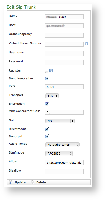| Subtitle |
|---|
| Prefix | figure |
|---|
| SubtitleText | "Edit Sip Trunk" form |
|---|
| AnchorName | edit sip trunk form |
|---|
|

|
In
| Xref |
|---|
| AnchorName | edit sip trunk form |
|---|
|
you can see an example configuration for creating a SECURE Inbound SIP Trunk. The mandatory
fields values are:
- NAME: a meaningful name for this trunk
- HOST: IP address/hostname of the SIP server provided by ITSP
- PORT: registration port of the service
- CONCURRENT CALLS: maximum number of calls on a single trunk
- DIRECTMEDIA: experimental sound management in P2P mode without routing the audio stream through the server
- SENDRPID: the Remote Party ID, used to interconnect with VoIP Provider for the management of privacy
- DTMFMODE: tone signaling technology used for this SIP interconnection
- ALLOW: voice codecs used in this trunk
- DISALLOW: voice codecs denied in this trunk
- this is 5061 by RFC
- TRANSPORT: pro
- DIRECTMEDIA: check it enabled
- SENDRPID: check it enabled
The default values for Port, Allow and Disallow are usually work well, however feel free to change them to suite your needs better.
Mandatory Optional fields are:
- NAT: enable/disable the Network Address Translation configuration
- AUDIO TONES: this is used for Audio Messaging. The possible values are:
- NO AUDIO TONES: no audio messages would be played on this trunk
- ON EARLY MEDIA: the audio messages would be played using SIP early offer
ON ANSWERED CALLS: the audio messages would be played using SIP delayed offerCONCURRENT CALLS: you can leave the default, which is often a practice value for the day-by-day service and change it later if you notice call drops on this Trunk.- NAT: check this box if you are not using directly the public IP address.
- AUDIO TONES: ON EARLY MEDIA works fine with the Cisco Unity Call Manager. Avaya instead can deal with both N EARLY MEDIA and ON ANSWERED CALL.
- DTMFMODE: choose your values considering the PBX on the other end of the Trunk. Usually we suggest to choose the value RFC2833
- ALLOW: the values of this fields highly depends from what the other end is capable of. Our suggestion is to leave the default: g729,amr,gsm,ulaw,alaw
- DISALLOW: the values of this fields highly depends from what the other end is capable of. Our suggestion is to leave this field empty.
